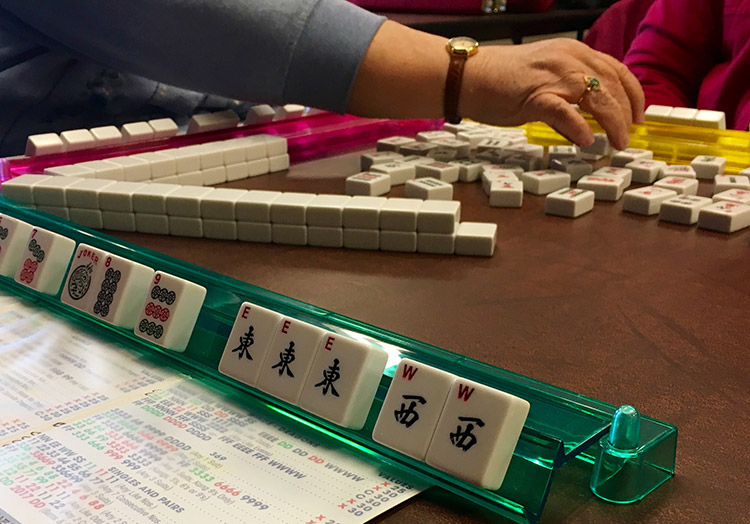
Mah Jongg, for those who are not familiar with it, is a game involving tiles of various “suits” and a card showing possible arrangements of tiles. In order to win, you must complete one of these arrangements before your opponents do. You need to strategize to choose one arrangement as your goal and then decide which tiles to collect to complete the arrangement. You must also keep track of other players’ actions and use this information to decide which tiles to pass. All this challenges the brain, and researchers who have studied the effect on people’s brains of playing Mah Jongg report that compared to non-players, the Mah Jongg players had sharper minds and more long-lasting memory. Playing this game is thought to help prevent or delay dementia.
“Regardless of frequency of playing, mahjong produced consistent gains across all cognitive performance measures – digit forward memory, verbal memory, and MMSE. The effects lasted after mahjong had been withdrawn for a month, suggesting that constant practice is not necessary to achieve therapeutic effect once an initial threshold is attained.” – International Journal of Geriatric Psychiatry
Mah Jongg makes use of different cognitive skills, including attention, which is needed to keep track of tiles discarded by other players. Pattern recognition is also involved, as the tiles have different designs, letters, and/or numbers on them, and one must be able to quickly distinguish between a “wind,” “flower,” “soap,” “bam,” “crak,” “dot” or “dragon.” The need to recognize arrangements and weigh the odds of trying to complete each involves making decisions quickly. And it is helpful if you can remember which player is picking up which tiles, to try to determine your opponents’ strategies. In addition, the possible arrangements one can make, shown on the official Mah Jongg card, change each year, further increasing the challenge of the game.
One of the most important lifestyle practices for better brain health is socializing, and this is definitely a part of playing Mah Jongg. Researchers have noted that since Mah Jongg is a social activity, participating in informal conversations positively affects one’s overall happiness. In many instances people play the game with people they are meeting for the first time, so it can result in a wider diversity of relationships, and in the formation of new friendships.
The National Mah Jongg League, the organization which standardizes the rules for American Mah Jongg, estimates that it has more than 350,000 members with new people joining every day.
So, if you want to keep your mind and memory sharp, consider learning and playing Mah Jongg!